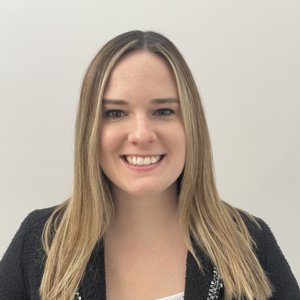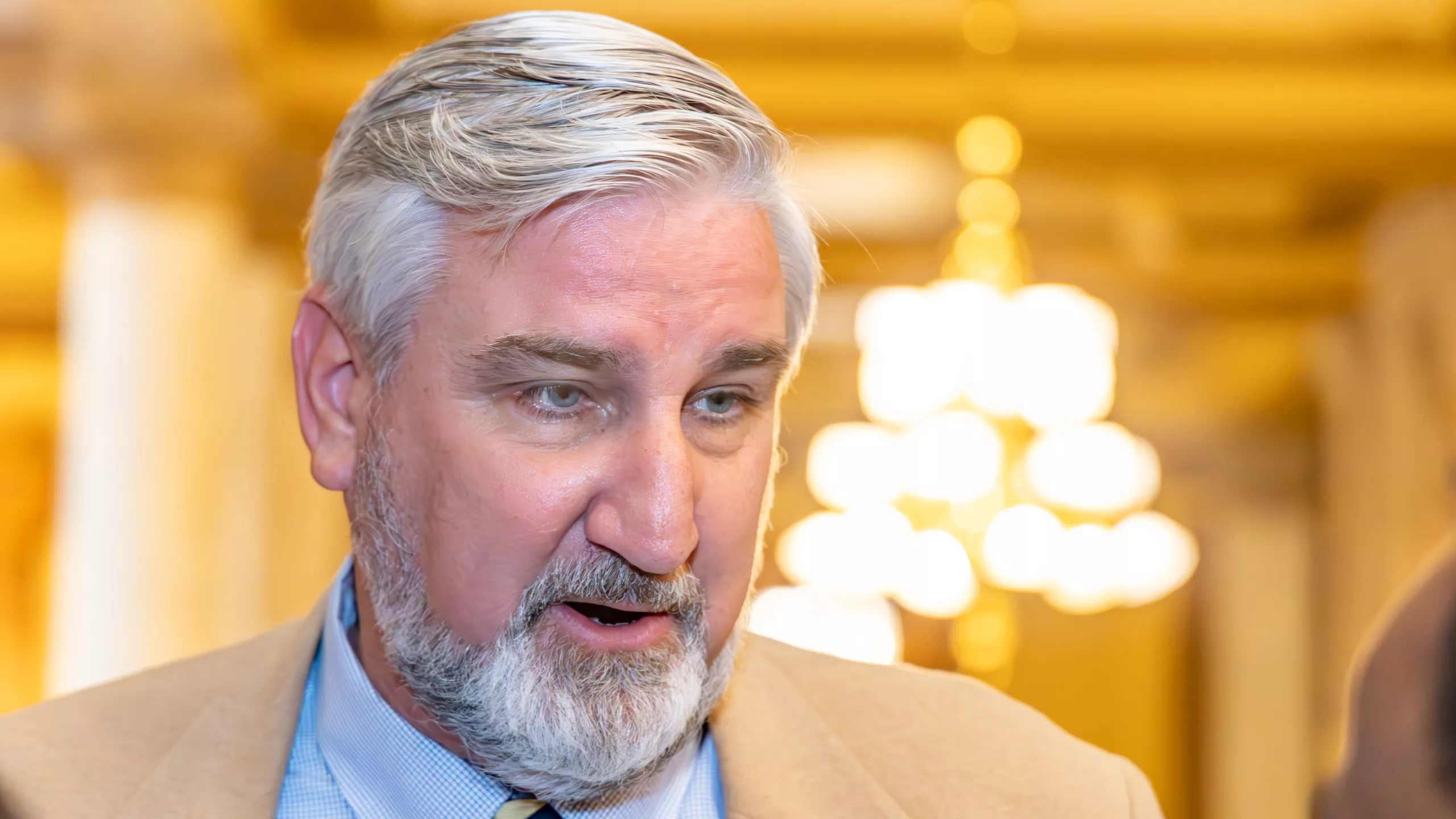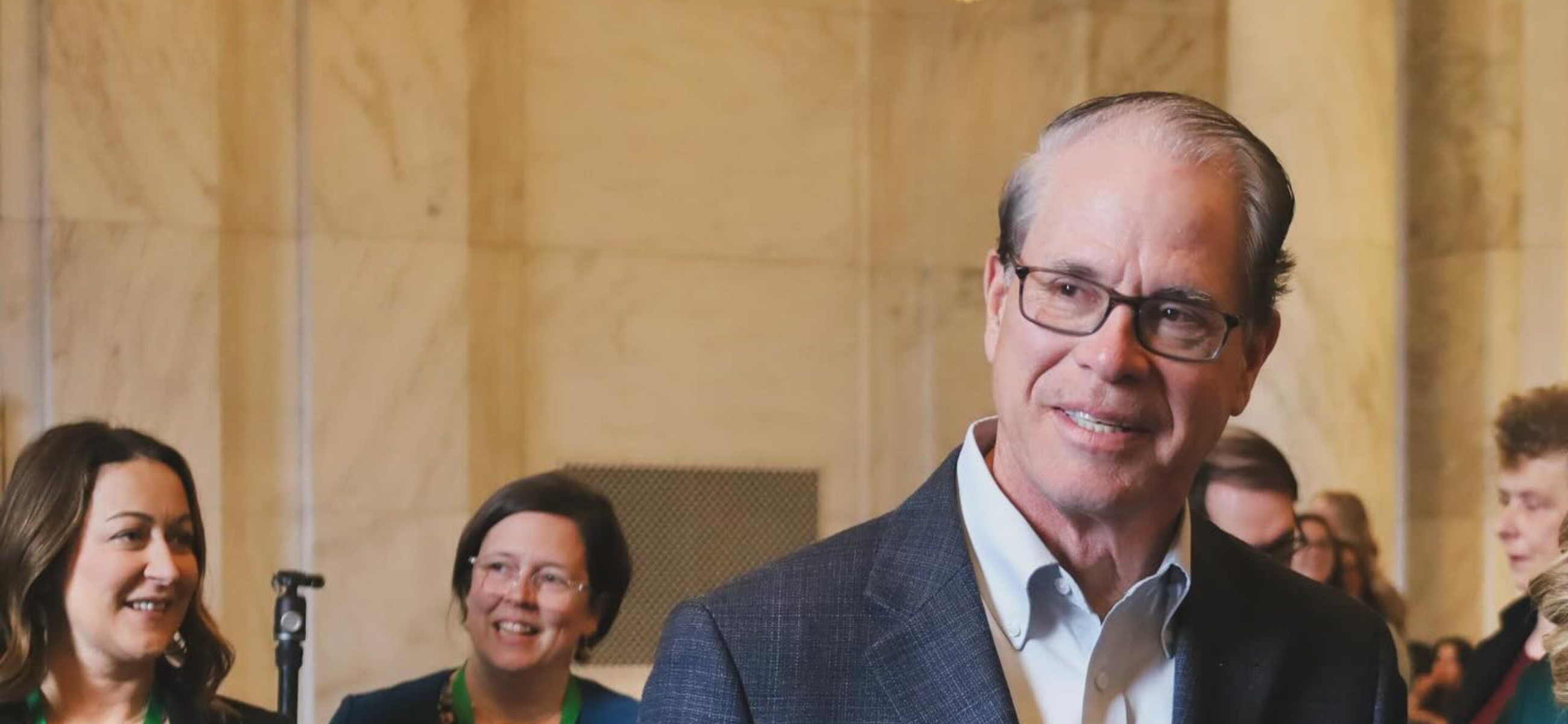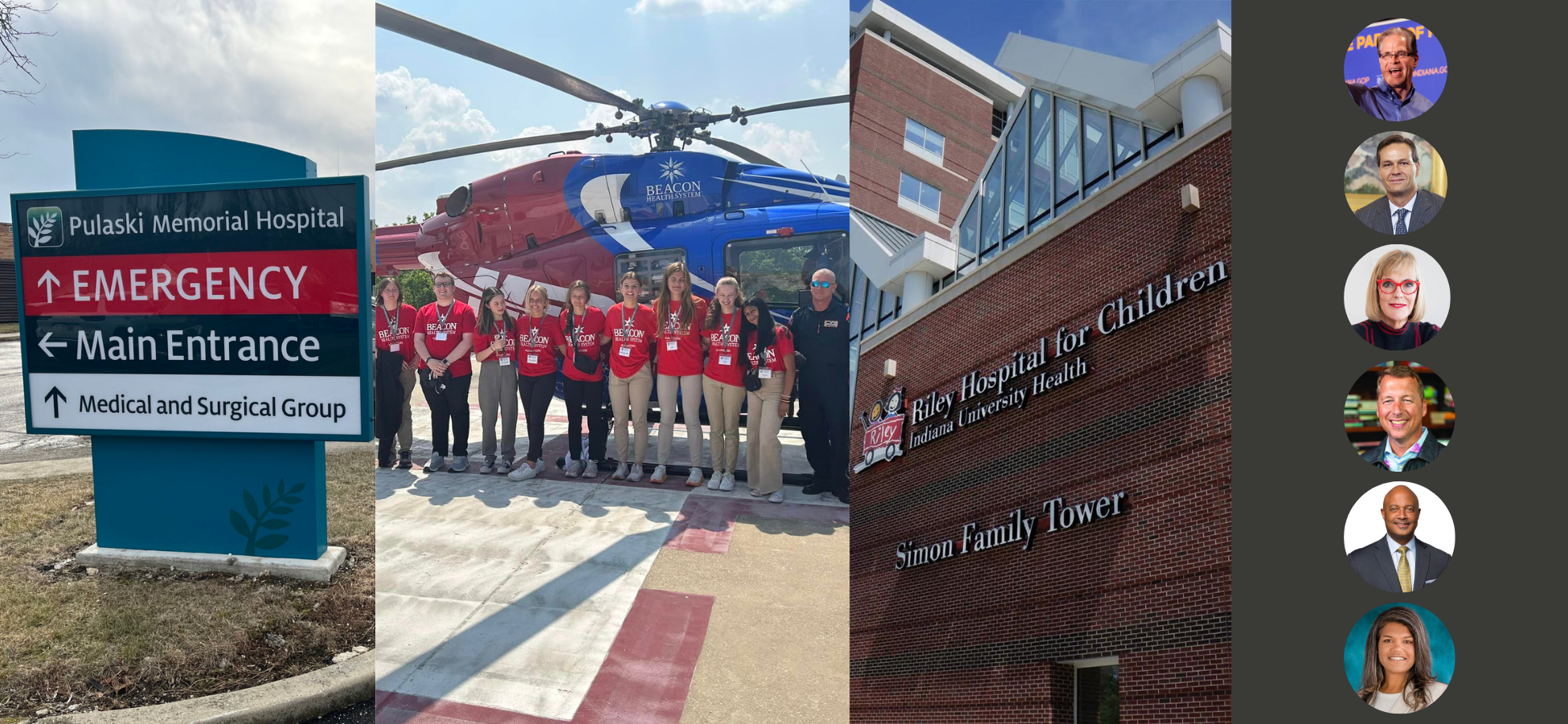Stay ahead of the curve as a political insider with deep policy analysis, daily briefings and policy-shaping tools.
Request a DemoHouse’s new chief budget writer talks about his budget-crafting decisions
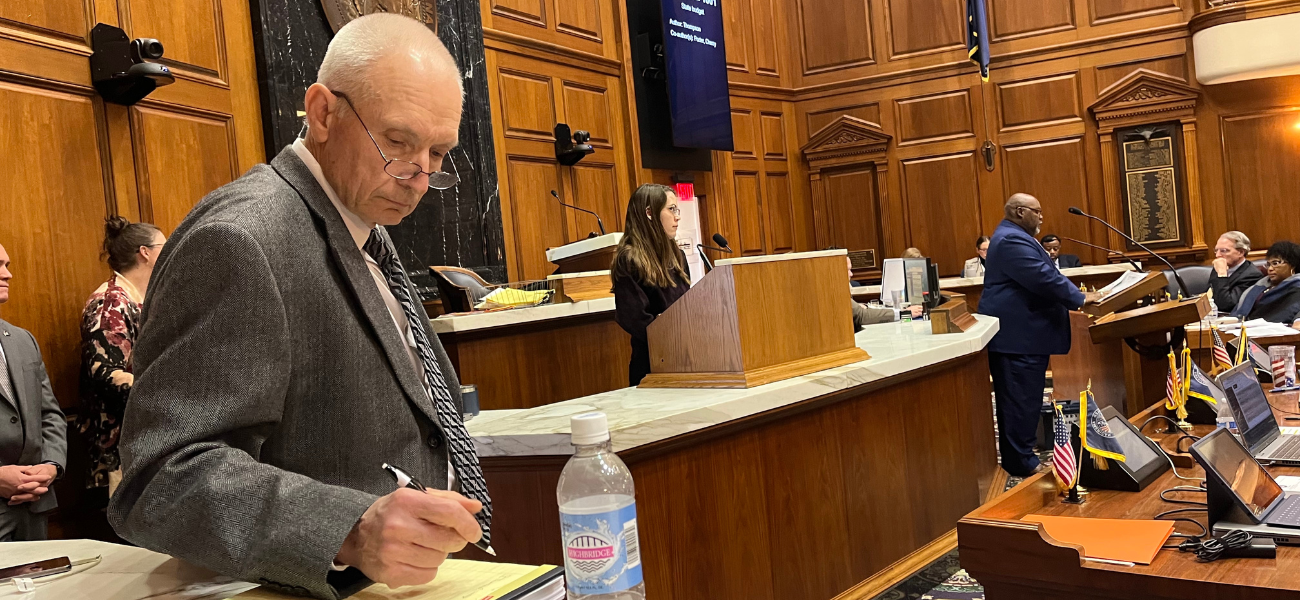
Rep. Jeff Thompson, R-Lizton, takes notes as Rep. Greg Porter, D-Indianapolis, speaks during a 2023 House session. (Credit: Kaitlin Lange)
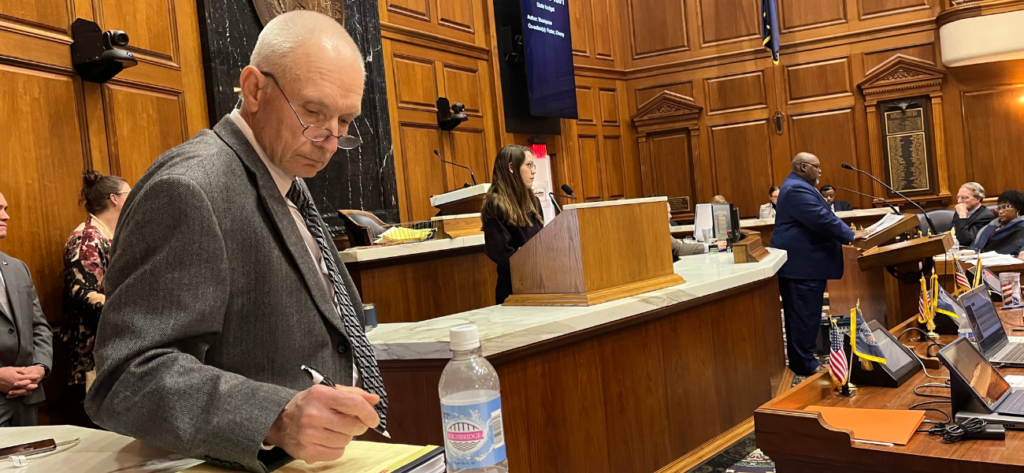
Rep. Jeff Thompson is one of the most powerful Hoosiers. As chair of the House Ways and Means Committee, the Lizton Republican leads the budget-writing process in the House and helps decide how the state spends billions of taxpayer dollars.
While Thompson is new to chairing the influential committee, replacing former Rep. Tim Brown, he’s no stranger to the Statehouse. Years before he was first elected in 1998, Thompson watched his father serve in the Statehouse for almost two decades.
Prior to his appointment as chair of the House Ways and Means Committee, Thompson garnered little media attention due in part to his reserved nature.
State Affairs sat down with Thompson to talk about his new role, what he likes to do in his free time and how he decided what to spend money on in the budget. The budget bill recently passed the House chamber and now moves to the Senate for consideration. He also weighed in on property tax relief and a budget amendment prohibiting any funding from going to Indiana University’s Kinsey Institute, a sex, gender and reproduction research institute.
The interview has been edited for brevity and clarity.
Q. Your dad was a state lawmaker too. Did you always know you wanted to be one yourself?
A. When he was about six months in, I thought someday I might want to do this. And 20 years later, it’s a different seat and not the one he represented because [the districts] move every time you redistrict, but I think being around it made me interested in doing it. So yes, but it's all timing, being at the right place at the right time, and knowing when the right time was.
Q. Did you know you wanted to be the House Ways and Means Committee chair or was that something that the speaker had to encourage you to take?
A. That would have never entered my mind [when I was first elected]. When Dr. Brown decided not to run again, [I thought] if I'm the best person, so be it; if I’m not the best person, so be it, too. I'd still be working and doing stuff, but the speaker thought [I should be chair].
Q. You just crafted your first budget. What was the most challenging part of that?
A. I’m going to answer what made it so nice. The staff is so good. We spent a lot of nights until 9 p.m. I knew that going into it. It’s just a very methodical process, and you may have heard me say it a couple of times even in committee, the hay is on the ground. I still bale hay some. You’ve got to bale it. It’s going to be difficult at times.
Q. Was it difficult to have to tell your fellow lawmakers “no” on some things?
A. Well, you don’t look forward to it. It isn’t the highlight of your day. That’s kind of the territory; you know it going into it. You try to have reasons and rationale. And no doubt the fact that we had some additional dollars that really were one-time dollars, made it more difficult, but again, I knew that when I showed an interest in being here.
Q. You don’t seem like a big talker. Do you think that’s helped or hurt you in this role?
A. Yeah, I don’t put my foot in my mouth quite as often. That’s one of my favorite sayings. It doesn’t hurt anything: You don't have to talk a lot. It’s the words you do say [that matter]. And obviously I’m not a natural one to get up and talk for hours on end. But, that’s part of the role, too, and I accepted that when I signed up.
Q. In what policy areas do you think you differ from your predecessor, Dr. Tim Brown?
A. I think we’re very, very similar, really similar, in a sense of what we have in a big picture. I would say that the difference is I know that [Brown, known as] Doc had a much better handle on the whole health care industry, his profession. And I probably have a better handle on education, my profession. That's going to happen regardless. We're a citizen Legislature and so what you’ve done [for work], you probably are more aware of.
So I’m not saying that Doc is better or Doc is worse, but Doc is just different. And Doc did a great job. I loved working with Doc. I encouraged Doc to run again. That was Doc’s call.
Q. You mentioned that you were a teacher. How does that inform how you approach the budget, especially because this budget is a pretty significant expansion of vouchers?
A. Well it’s a philosophy, more than being a teacher in some regards, that I want to treat children the same. And as I said on the floor yesterday, I’m OK if all the parents choose to send their children to public schools. But likewise, if parents believe it’s the best choice to have their child in a different school than a traditional public school, I’m very supportive of that.
I philosophically believe parents should be the one deciding and [it shouldn’t be] the way we fund that drives them to one side or the other. So really it’s a philosophy of do you put parents in a box or give them options. I want to give parents options. Let them be the ones to decide. I know that’s something that maybe my profession [doesn’t agree with], but there are some that agree with me, more than you might think.
Q. What do you think the main sticking points between the House and the Senate will be on the budget?
A. I suppose, it could be maybe the tax cuts. It could be the amount of the [contribution to the] pre-96 fund [Editor’s note: Lawmakers are working to pay off the unfunded liability of this teacher pension fund]. We obviously put $250 million in the second year. The governor's budget had $100 billion up front. We'll see. We'll find a spot to land.
I encourage [people to] find ways to make this budget better. I like to claim it's picture perfect, and the Senate should just take it and they just agree to it, no amendments, but that's probably not going to happen. We can improve things. Why should I stand in the way of that?
Q. Your budget contains some property tax relief items that were in House Bill 1499, but it only kicks in during future years. Why did you decide against doing something to provide relief this spring?
A. Well, that is extremely difficult — to do things to delay tax bills that will cause a massive disaster, and we have some things you can do next fall [to ease the burden]. But I can tell you local officials do not want [to delay tax bills]. They really pushed back and rightfully so. I would like to do something, but there's no option.
Q. Your budget doesn't provide as much money for public health as Gov. Eric Holcomb called for. Why did you land on the number that you did in terms of how much to contribute to that?
A. Well, I don't believe you'll have all counties opt in [to the program], for one thing. It's going to be a process and we also think that we're going to somehow engage the providers and the providers are going to be the key. This is a work in progress.
Q. You were among those that voted for the amendment to the budget prohibiting state funds from going to the Kinsey Institute. Is that something you'd push for in the final version of the bill?
A. I think that was just a statement from people that voted for that, about just the idea, but it's not going to have any effect, I don’t think, in the end. IU receives about 15% of their revenue from the state, but we'll see what happens.
Q. Does that mean you think it won't be in the final budget or does that mean you just think it won't have an impact on IU if it is in the final bill?
A. I’m not sure at this point what is going to happen. Obviously the Senate will have their way, if they want to leave it in there or not, and we’ll go from there.
Q. What do you wish normal Hoosiers knew about the budget process or the budget?
A. Just how sound Indiana's fiscal state is. It is really, really sound.
And there's a reason why we have the highest growth in terms of population of any of our four surrounding states. We exceed all of them. People are coming here for a reason. People are speaking with their feet across this country, and you're seeing a move to certain select states and leaving others. Some states are extremely poorly managed in the fiscal sense, and some are just like Indiana, and we’re seeing those are the ones that are growing, and businesses are coming there. People want to be there.
Q. Are there any areas of the budget that you wouldn’t want to compromise on?
A. It’s probably premature to say that you won’t do something. You have to be really careful, because you’ve got to land at a spot. Yeah, there’s some things I feel pretty strong about in there, but I just don’t want to put a stake in the ground right now. It’s over two months away until we’re done with this process.
Q. What do you feel pretty strongly about then?
A. In education, the fact that we have parental choice. And obviously, I like the tax cuts. But to say it has to be identical to the letter, you can’t change a single word, I would want to be careful making that statement. I still feel strong about it. We’ll work with the Senate and we’ll find a spot to land.
Q. I want to use this Q&A to help people get to know who you are as a person, as well. What do you like to do for fun?
A. I love working in the garden. I’ve got four gardens. If you can imagine it, I grow it.
Tomatoes and potatoes and onions and peppers and green beans and kale and spinach and lettuce and cucumbers. I can't name them all right now. I have a list. It's in my car. It's that long, of all the stuff that I’ve got seeds for and am planting.
Q. How did you get into gardening?
A. I farmed before I got into politics, and so when I gave it up I kind of jokingly teased my wife: I could start playing golf now or I could have all these vegetables. It’s expanded quite a bit because a lot of our meals, [they’re] from the garden.
And I like to go to state parks. I love state parks. Go walk out in the woods.
Q. What’s your favorite if you had to name one?
A. I would probably say Clifty Fall in Madison. You haven’t been there? You’re really missing out.
Q. Last question: You've been in office for a while. How would you say the Statehouse has changed since you were first elected?
A. The biggest thing is probably the use of technology. I was probably slower than most to embrace it, but I have.
But you know how we get along. We have differences of opinions, but we still have good relationships between the members of the two respective parties and mutual respect. I just think that’s critical. Hoosiers should expect that.
Obviously, you look to the east a few hundred miles and we don’t see that, and we don’t want our state to become that way. We’re going to disagree, and that’s OK. We want to have it in a civil and respectful way. And just because someone disagrees with you doesn't mean that you can't treat them with respect and be a friend even.
Contact Kaitlin Lange on Twitter @kaitlin_lange or email her at [email protected].
Twitter @StateAffairsIN
Facebook @stateaffairsin
Instagram @stateaffairsin
LinkedIn @stateaffairs
In case you missed it: Budget 101: A look at how Indiana decides what money goes where
Read this story for free.
Create AccountRead this story for free
By submitting your information, you agree to the Terms of Service and acknowledge our Privacy Policy.
Child care: Where Republican candidates for governor stand
Six candidates are seeking the Republican nomination for Indiana governor in the May 7 primary. State Affairs is providing looks at their stances on several issues. Jennifer McCormick is unopposed for the Democratic nomination.
Indiana’s high cost of child care ranks as a primary concern for many of the state’s families.
According to Child Care Aware of America, a nonprofit organization that studies child care costs, Indiana ranks as the eighth most expensive state for infant and toddler care. The cost for caring for a baby averages 14.5% of a family’s median income, while toddler care is 12.9%.
Only 5% of Indiana families can afford infant care, the Economic Policy Institute found.
State Affairs asked each of the six Republicans vying for Indiana governor — U.S. Sen. Mike Braun, former state Secretary of Commerce Brad Chambers, Lt. Gov. Suzanne Crouch, Fort Wayne businessman Eric Doden, former state Attorney General Curtis Hill and Indianapolis mother Jamie Reitenour — how they would lower Indiana families’ child care costs if elected.
Here are their responses.
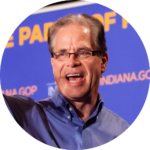
Mike Braun
“The high cost of child care burdens Hoosier families and businesses, who are trying to recruit and retain the best workers. As governor, I am open to and will work on solutions that will reduce the cost of child care, which is a win for our economy and families.”
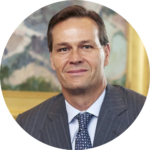
Brad Chambers
“As governor, I’ll explore strategic expansions of all-day pre-K for 3- and 4-year-olds, including potentially increasing the income eligibility level for state-funded pre-K programs. I’ll create a state-level child care tax credit that requires recipients to work to be eligible to receive it.”
Chambers said he would also explore incentives for employer-sponsored child care.

Suzanne Crouch
“First, I would lead the effort to eliminate the state’s individual income tax, which will mean more money in families’ pockets and help reduce the financial strain of child care expenses … As governor, I would propose that the General Assembly put a priority on early childhood education throughout Indiana.”
Crouch would also support the expansion of at-home and religious-based child care, she said, noting Indiana has “some of the highest relative child care costs in the country.”

Eric Doden
“I’ve offered a bold plan to expand pre-K access to every community in the state. By partnering with communities, nonprofits and education partners, we will begin addressing this important need. … We need a state with thriving communities and access to opportunity. Cost of child care concerns are downstream of family formation rates, good-paying jobs, home ownership and a host of other economic and community issues.”
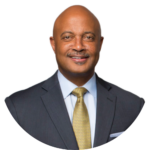
Curtis Hill
“The government is not responsible for providing child care for private sector employees. Its responsibility is to dismantle the licensing and regulatory burden that prohibits new child care providers from entering the market. If we want to lower the cost of child care, we must cut the government regulations forcing child care facilities to either close or raise prices to meet unnecessary government requirements.”

Jamie Reitenour
“We cannot bear down on taxpayers for everything. We just cannot do it. But we can talk to the private sector and reason together. Can we have in-house day cares at offices? Yes. Can we have employers operate growth centers for employees’ kids? Yes. Taxpayers are not the answer; the private sector is. With competition for qualified workers, larger businesses already employ creative benefits, including child care assistance, to attract talent.”
Read these related stories:
Contact Rory Appleton on X at @roryehappleton or email him at [email protected].
And subscribe to State Affairs so you do not miss an update.
Facebook @stateaffairsin
Poll finds Holcomb popular among Republicans even as potential successors keep distance
Indiana Gov. Eric Holcomb remains popular among Republicans, according to a State Affairs/Howey Politics Indiana poll, even as the GOP candidates to take his place have kept their political distance from him. The polling results released Thursday show Holcomb with an overall positive job-approval rating of 69% among self-identified Republicans and Republican-leaning independents. The results …
‘It’s sort of a blowout’: Braun holds commanding lead in State Affairs/Howey Politics Indiana poll
U.S. Sen. Mike Braun holds a commanding lead in a new State Affairs/Howey Politics Indiana poll of likely Hoosier Republican voters in the May 7 gubernatorial primary. Asked who they would vote for if the primary were held today, 44% of respondents picked Braun. Lt. Gov. Suzanne Crouch trailed with 10% of the vote, and …
Health care: Where Republican candidates for governor stand
Six candidates are seeking the Republican nomination for Indiana governor in the May 7 primary. State Affairs is providing looks at their stances on several issues. Jennifer McCormick is unopposed for the Democratic nomination.
The cost and quality of health care are top-of-mind issues for many Indiana voters, and the six Republican gubernatorial candidates — U.S. Sen. Mike Braun, former state Secretary of Commerce Brad Chambers, Lt. Gov. Suzanne Crouch, Fort Wayne businessman Eric Doden, former Attorney General Curtis Hill and conservative activist Jamie Reitenour — have plans to address them.
KFF, formerly the Kaiser Family Foundation, a nonpartisan nonprofit that studies health care policy, found Indiana ranked as the 19th most expensive state in per capita health care costs.
State costs for Medicaid, the federal program that covers some 2.2 million low-income Hoosiers and more than half of the state’s children, continue to grow.
Most of the candidates call for increased transparency from providers, while some focus their health care platforms on relitigating the state’s handling of the COVID-19 pandemic.
So, how would each of the six Republican candidates for governor seek to address health care needs and costs if elected?

Mike Braun
Braun’s platform claims Indiana’s high health care costs limit new businesses and burden Hoosiers.
“Solutions such as transparency, innovation, competition and empowering consumers are not hard to figure out but will take bold leadership to implement in the face of the powerful health care lobby.”
As a senator, Braun introduced in December the bipartisan “Health Care Price Transparency Act 2.0.” The federal legislation would require hospitals to publish prices for all services, allowing patients to compare costs.

Brad Chambers
“We need to make sure physicians are free to compete in hospitals. … We need to have transparency in pricing, and then we need to get the hospitals, physicians, insurance companies and pharma in a room and figure out a solution to lower Indiana’s health care costs,” Chambers said at a March 19 candidate forum.

Suzanne Crouch
Crouch has also called for price transparency from providers.
“You can go shop around for a car, but if you want a knee replaced, good luck,” Crouch said at the March 19 candidate forum.
Crouch’s platform proposes increased funding for mental health and addiction-related services. In March, she launched a television ad promising action on addiction and the opioid crisis.
In February, Crouch, as lieutenant governor, called for an audit of the Family Social Services Administration after the agency proposed cuts to a plan that compensates parents who provide attendant care to their children.

Eric Doden
Health care transparency is one of several issues spelled out in Doden’s platform.
“The state of Indiana spends billions of dollars each year on health care while providing special tax breaks to health care institutions. As governor, I will implement a plan to ensure hospitals provide full transparency in pricing and their use of taxpayer funding.”
He also seeks to incentivize more community investment from nonprofit health care institutions and pledges to provide additional resources for addiction treatment.

Curtis Hill
“We need to make sure that costs are transparent and people understand what the services are. And then we can improve the quality of service,” Hill said at a March 19 candidate forum.
Hill touts his rejection of mask and vaccination mandates to begin his health care plan.
The former Indiana attorney general also focuses his platform largely on protecting patients’ and parents’ legal rights:
“Under a Hill administration, the government will get out of the exam room and support parents making decisions for their children.”

Jamie Reitenour
Reitenour’s health platform calls for additional transparency and the protection of religious freedoms when it comes to care decisions.
“Together, let’s restore health freedom in Indiana by protecting the provider-patient relationship, increasing the capacity and resilience of our health care system [and] restoring consumer confidence in health care providers and organizations.”
She also pushed against what she called the “government overreach” of COVID-19 mandates at a March 19 candidate forum.
Read these related stories:
Contact Rory Appleton on X at @roryehappleton or email him at [email protected].
And subscribe to State Affairs so you do not miss an update.
Facebook @stateaffairsin
Instagram @stateaffairsin
LinkedIn @stateaffairs
